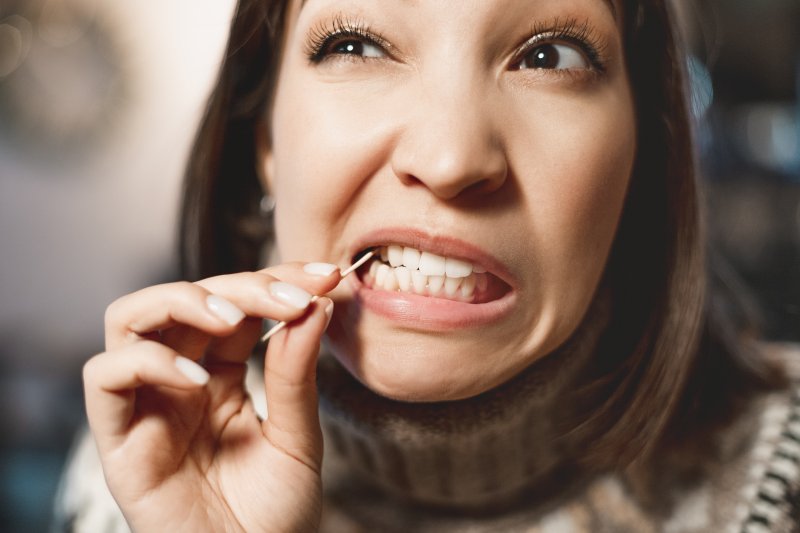
Toothpicks have been used for centuries as a quick and simple way to remove food particles stuck between teeth. While they’re convenient and widely available, many dental professionals caution against using them regularly. So, are toothpicks actually bad for your teeth? The answer isn’t completely black and white, but in many cases, yes, they can do more harm than good.
The Problem with Wooden Toothpicks
Wooden toothpicks, the most commonly used type, are stiff, sharp, and often splinter easily. When used aggressively or incorrectly, they can lead to several oral health problems.
Gum Damage
Toothpicks can easily injure your gums, especially if you poke too hard or misjudge where you’re placing it. Repeated trauma can lead to irritation, swelling, or even gum recession over time.
Tooth Damage
Using a wooden toothpick with excessive force can chip or wear away enamel, particularly if you have existing dental work like fillings, veneers, or crowns. The risk is even greater if a tooth is already weakened.
Splinters and Infection
Wooden toothpicks can break or splinter, leaving tiny pieces lodged in your gums. These can become infected if not removed properly, creating more serious dental problems.
Misalignment and Spacing Issues
Constant toothpick use, especially in tight spaces between teeth, can actually widen gaps over time or irritate periodontal tissues.
When Toothpicks Might Be Okay
In some situations, toothpicks can be used safely, especially when no other cleaning tool is available. Plastic toothpicks or dental picks made specifically for oral use are a better option, as they’re gentler on the gums and less likely to splinter. Soft, rubber-tipped picks are even safer and more effective at cleaning between teeth without damaging soft tissue.
If you do choose to use a toothpick occasionally, follow these tips:
- Use gentle pressure to avoid injuring your gums.
- Never force the toothpick between teeth.
- Choose toothpicks designed for dental use rather than regular wooden ones.
- Don’t substitute toothpicks for a full oral hygiene routine.
Better Alternatives for Cleaning Between Teeth
Dentists recommend flossing daily to remove plaque and food particles between teeth. Floss reaches places that toothpicks can’t and is less likely to cause damage. Other excellent alternatives include:
- Interdental brushes: Small, reusable brushes that fit between teeth and clean effectively.
- Water flossers: These devices use a stream of water to clean between teeth and along the gumline, ideal for people with braces, implants, or limited dexterity.
- Soft dental picks: These are gentle and safe for the gums while still being effective.
Toothpicks may be a convenient way to dislodge food in a pinch, but they are not the best tool for long-term dental hygiene. Improper or excessive use can damage your teeth and gums. For healthier results, stick to dentist-recommended methods like flossing, interdental brushes, or water flossers. Your smile and your gums will thank you.
About the Author
Dr. Prakash Gadhiya is a graduate of the prestigious NYU College of Dentistry and has practiced dentistry in both Pennsylvania and Texas, gaining experience in areas including endodontics, prosthodontics, orthodontics, oral surgery, and dental implants. Are you experiencing a dental emergency? Dr. Gadhiya and our expert team can help! Schedule your appointment online or call our Frisco office at (214) 308-5359.
